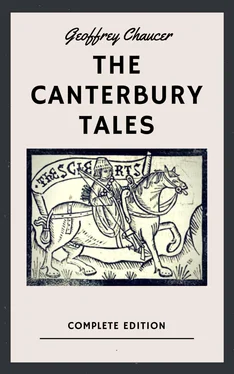30. Countour: Probably a steward or accountant in the county court.
31. Vavasour: A landholder of consequence; holding of a duke, marquis, or earl, and ranking below a baron.
32. On the dais: On the raised platform at the end of the hall, where sat at meat or in judgement those high in authority, rank or honour; in our days the worthy craftsmen might have been described as "good platform men".
33. To take precedence over all in going to the evening service of the Church, or to festival meetings, to which it was the fashion to carry rich cloaks or mantles against the home- coming.
34. The things the cook could make: "marchand tart", some now unknown ingredient used in cookery; "galingale," sweet or long rooted cyprus; "mortrewes", a rich soup made by stamping flesh in a mortar; "Blanc manger", not what is now called blancmange; one part of it was the brawn of a capon.
35. Lodemanage: pilotage, from Anglo-Saxon "ladman," a leader, guide, or pilot; hence "lodestar," "lodestone."
36. The authors mentioned here were the chief medical text- books of the middle ages. The names of Galen and Hippocrates were then usually spelt "Gallien" and "Hypocras" or "Ypocras".
37. The west of England, especially around Bath, was the seat of the cloth-manufacture, as were Ypres and Ghent (Gaunt) in Flanders.
38. Chaucer here satirises the fashion of the time, which piled bulky and heavy waddings on ladies' heads.
39. Moist; here used in the sense of "new", as in Latin, "mustum" signifies new wine; and elsewhere Chaucer speaks of "moisty ale", as opposed to "old".
40. In Galice at Saint James: at the shrine of St Jago of Compostella in Spain.
41. Gat-toothed: Buck-toothed; goat-toothed, to signify her wantonness; or gap-toothed — with gaps between her teeth.
42. An endowment to sing masses for the soul of the donor.
43. A ram was the usual prize at wrestling matches.
44. Cop: Head; German, "Kopf".
45. Nose-thirles: nostrils; from the Anglo-Saxon, "thirlian," to pierce; hence the word "drill," to bore.
46. Goliardais: a babbler and a buffoon; Golias was the founder of a jovial sect called by his name.
47. The proverb says that every honest miller has a thumb of gold; probably Chaucer means that this one was as honest as his brethren.
48. A Manciple — Latin, "manceps," a purchaser or contractor - - was an officer charged with the purchase of victuals for inns of court or colleges.
49. Reeve: A land-steward; still called "grieve" — Anglo-Saxon, "gerefa" in some parts of Scotland.
50. Sompnour: summoner; an apparitor, who cited delinquents to appear in ecclesiastical courts.
51. Questio quid juris: "I ask which law (applies)"; a cant law- Latin phrase.
52 Harlot: a low, ribald fellow; the word was used of both sexes; it comes from the Anglo-Saxon verb to hire.
53. Significavit: an ecclesiastical writ.
54. Within his jurisdiction he had at his own pleasure the young people (of both sexes) in the diocese.
55. Pardoner: a seller of pardons or indulgences.
56. Newe get: new gait, or fashion; "gait" is still used in this sense in some parts of the country.
57. Vernicle: an image of Christ; so called from St Veronica, who gave the Saviour a napkin to wipe the sweat from His face as He bore the Cross, and received it back with an impression of His countenance upon it.
58. Mail: packet, baggage; French, "malle," a trunk.
59. The Bell: apparently another Southwark tavern; Stowe mentions a "Bull" as being near the Tabard.
60. Cheap: Cheapside, then inhabited by the richest and most prosperous citizens of London.
61. Herberow: Lodging, inn; French, "Herberge."
62. The watering of Saint Thomas: At the second milestone on the old Canterbury road.
THE KNIGHT'S TALE <1>
WHILOM*, as olde stories tellen us, *formerly
There was a duke that highte* Theseus. *was called <2>
Of Athens he was lord and governor,
And in his time such a conqueror
That greater was there none under the sun.
Full many a riche country had he won.
What with his wisdom and his chivalry,
He conquer'd all the regne of Feminie,<3>
That whilom was y-cleped Scythia;
And weddede the Queen Hippolyta
And brought her home with him to his country
With muchel* glory and great solemnity, *great
And eke her younge sister Emily,
And thus with vict'ry and with melody
Let I this worthy Duke to Athens ride,
And all his host, in armes him beside.
And certes, if it n'ere* too long to hear, *were not
I would have told you fully the mannere,
How wonnen* was the regne of Feminie, <4> *won
By Theseus, and by his chivalry;
And of the greate battle for the nonce
Betwixt Athenes and the Amazons;
And how assieged was Hippolyta,
The faire hardy queen of Scythia;
And of the feast that was at her wedding
And of the tempest at her homecoming.
But all these things I must as now forbear.
I have, God wot, a large field to ear* *plough<5>;
And weake be the oxen in my plough;
The remnant of my tale is long enow.
I will not *letten eke none of this rout*. *hinder any of
Let every fellow tell his tale about, this company*
And let see now who shall the supper win.
There *as I left*, I will again begin. *where I left off*
This Duke, of whom I make mentioun,
When he was come almost unto the town,
In all his weal, and in his moste pride,
He was ware, as he cast his eye aside,
Where that there kneeled in the highe way
A company of ladies, tway and tway,
Each after other, clad in clothes black:
But such a cry and such a woe they make,
That in this world n'is creature living,
That hearde such another waimenting* *lamenting <6>
And of this crying would they never stenten*, *desist
Till they the reines of his bridle henten*. *seize
"What folk be ye that at mine homecoming
Perturben so my feaste with crying?"
Quoth Theseus; "Have ye so great envy
Of mine honour, that thus complain and cry?
Or who hath you misboden*, or offended? *wronged
Do telle me, if it may be amended;
And why that ye be clad thus all in black?"
The oldest lady of them all then spake,
When she had swooned, with a deadly cheer*, *countenance
That it was ruthe* for to see or hear. *pity
She saide; "Lord, to whom fortune hath given
Vict'ry, and as a conqueror to liven,
Nought grieveth us your glory and your honour;
But we beseechen mercy and succour.
Have mercy on our woe and our distress;
Some drop of pity, through thy gentleness,
Upon us wretched women let now fall.
For certes, lord, there is none of us all
That hath not been a duchess or a queen;
Now be we caitives*, as it is well seen: *captives
Thanked be Fortune, and her false wheel,
That *none estate ensureth to be wele*. *assures no continuance of
And certes, lord, t'abiden your presence prosperous estate*
Here in this temple of the goddess Clemence
We have been waiting all this fortenight:
Now help us, lord, since it lies in thy might.
"I, wretched wight, that weep and waile thus,
Was whilom wife to king Capaneus,
That starf* at Thebes, cursed be that day: *died <7>
And alle we that be in this array,
And maken all this lamentatioun,
We losten all our husbands at that town,
While that the siege thereabouten lay.
And yet the olde Creon, wellaway!
That lord is now of Thebes the city,
Fulfilled of ire and of iniquity,
He for despite, and for his tyranny,
To do the deade bodies villainy*, *insult
Of all our lorde's, which that been y-slaw, *slain
Читать дальше












